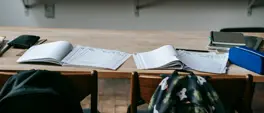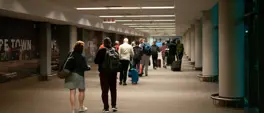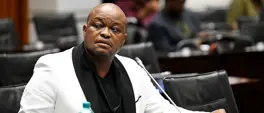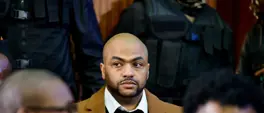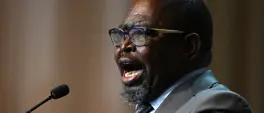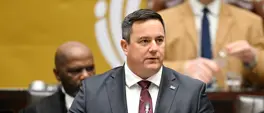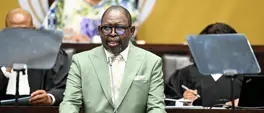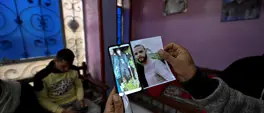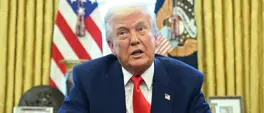VUKILE DLWATI | A R700m National Dialogue limits the butterfly that SA is dying to become
Vukile Dlwati
23 June 2025 | 9:28I believe the government is using the National Dialogue as a ruse to make citizens feel included and heard. But how long must we wait for tangible change, asks Vukile Dlwati.
- National Dialogue (1)
- Unemployment
- Unemployed youth
- South African Social Security Agency (SASSA)
- Democracy
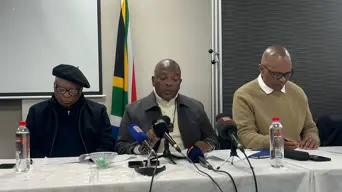
National Dialogue Preparatory Task Team members (from left to right) Oyama Mabandla, Nkosinathi Biko and Bongani Kupe during a media briefing in Johannesburg on Friday, 13 June 2025. Picture: Alpha Ramushwana/EWN
South Africa is dying to become a butterfly. Mzansi has been locked in its chrysalis for far too long. This is evident in the social regression at the hands of leadership that continues to shoot in the dark.
An adult butterfly goes through three stages before it can spread its wings and fly, namely the egg, larva (caterpillar), pupa (chrysalis) and adult.
If the chrysalis represents transformation, let the adult butterfly take the place of social freedom since 1994, and it’s clear that what could become an admirable creature is suffocating.
It is still blood-curdling to think that for 31 years of democracy, the country is still grappling with inequality, high unemployment, of which the youth bear the brunt, rampant crime, gender-based violence (GBV), to name some of our stagnation thorns.
President Cyril Ramaphosa, on Youth Month, announced a National Dialogue that will cost taxpayers R700 million.
According to the Presidency, the National Dialogue seeks to afford all citizens the opportunity to thrash out the country’s challenges and ways to remedy them.
The first National Convention, the Presidency says, will play out as an all-inclusive process for citizens to partake as individuals or organised groups, the first of which will take place on 15 August, thus setting the agenda for the National Dialogue.
It will be followed by nationwide discussions involving different “sectors on issues that citizens feel deserve national attention”, added the Presidency.
Thereafter, the Presidency explains, a second National Convention will take place at the start of 2026 to consolidate the discussions into “a common national vision and implementation programme”.
HOW MANY TALK SHOPS DOES SOUTH AFRICA NEED?
Are you telling me that at least R700 million is due to be spent on restructuring a society that bleeds absurd inequality?
I believe the government is using the National Dialogue as a ruse to make citizens feel included and heard. But how long must we wait for tangible change?
Time is running out for transformation and the reversal of our past injustices can be upended.
What happened to the National Development Plan (NDP) 2030? (Another talk shop running out of time.)
The 489-page NDP forward statement reads that it was devised "for the country to eliminate poverty and reduce inequality by 2030 through uniting South Africans, unleashing the energies of its citizens, growing an inclusive economy, building capabilities, enhancing the capability of the state and leaders working together to solve complex problems".
Look around and see how far we are from the finish line.
Advertise a vacancy and see the clout in terms of applicants because the official unemployment figure from Stats SA for the first quarter of 2025 is 32.9%.
Moreover, the youth aged between 15 and 34 comprise 50.2% of the country’s working-age citizens.
There’s also the invisible cohort that does not fit the youth bracket, who face being overlooked and disregarded, in an economy that has seen poor growth. To date, the economy saw growth of 0.6% in the fourth quarter of 2024, after a revised reduction in the previous year.
Unemployed graduates, youth seeking any form of work and those who have given up on the toil of searching for a means to buy bread and butter it. They are in despair, they resort to all sorts of ways to honour their existence, and at times they choose destruction that takes many forms.
Drugs, alcohol abuse, heavy depression, crime and leaning on nothing because there’s no structure to fall back on.
Many of the government’s decisions are attacks on citizens. Go to the South African Social Security Agency (SASSA) on Harrisson Street at 5am and see the elderly queuing for the offices to open as they brave the chills because it’s a few hours before the agency opens.
This is due to a failure of the system of changing to Postbank black cards that was planned in the dark, and therefore renders beneficiaries hopeless. Sometimes, it’s so dark that you don't realise that there are people until you see vapour escaping as they breathe or speak.
Not far from there, there’s the Department of Home Affairs, where the same scenario plays out.
It’s ineffable to observe this!
In KwaZulu-Natal, Premier Thami Ntuli had no idea that schools were not properly financed before exams commenced.
I could go on and on, but I doubt there’s even a sense of urgency or pressure to see it materialise due to the snail’s pace at which the nation is moving.
SOME OF SOUTH AFRICA’S PILLARS OF DIALOGUE
South Africa does have bodies whose agenda it is to remedy its social fabric and advancement in the current democratic dispensation through dialogue and outreach programmes.
They include the Ahmed Kathrada Foundation, the Nelson Mandela Foundation, and the Thabo Mbeki Foundation, all of which have since been represented in the National Dialogue after the Presidency cleared the air about media reports on their exclusion.
"Media reports that certain foundations belonging to the stalwarts of the liberation struggle have been sidelined or overlooked are inaccurate," said the Presidency.
How about channeling funds for youth empowerment initiatives, pragmatic ways of including the previously disenfranchised, and shortchanged by a system built to break them, in the mainstream economy, sorting out the mess that is the South African Social Security Agency, among others.
SOUTH AFRICA IS WAITING TO SOAR
Those elected to power really need to think hard about how citizens are overburdened by decision-makers, who are tone deaf, in a country that has so much potential for all to enjoy a decent existence free of suffering and despair.
South Africa wants to merrily spread its wings and for its people to see and feel its beauty and enchantment. And this can only happen when the leadership makes honest assessments of blatant failures that are jolting to the transformation project and social justice.
Trending News
More in Opinion
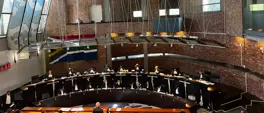
23 February 2026 11:45
CHRIS OXTOBY & JUDITH FEBRUARY | Is there a crisis of ethics in the South African judiciary?
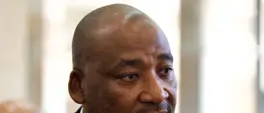
20 February 2026 14:45
JAMIL F. KHAN | Democratic institutions must be protected from rising religious fundamentalism
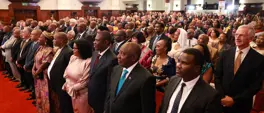
19 February 2026 05:15
CHARLES MATSEKE | From State of the Nation to Republic of Commissions: SA's playhouse of accountability
